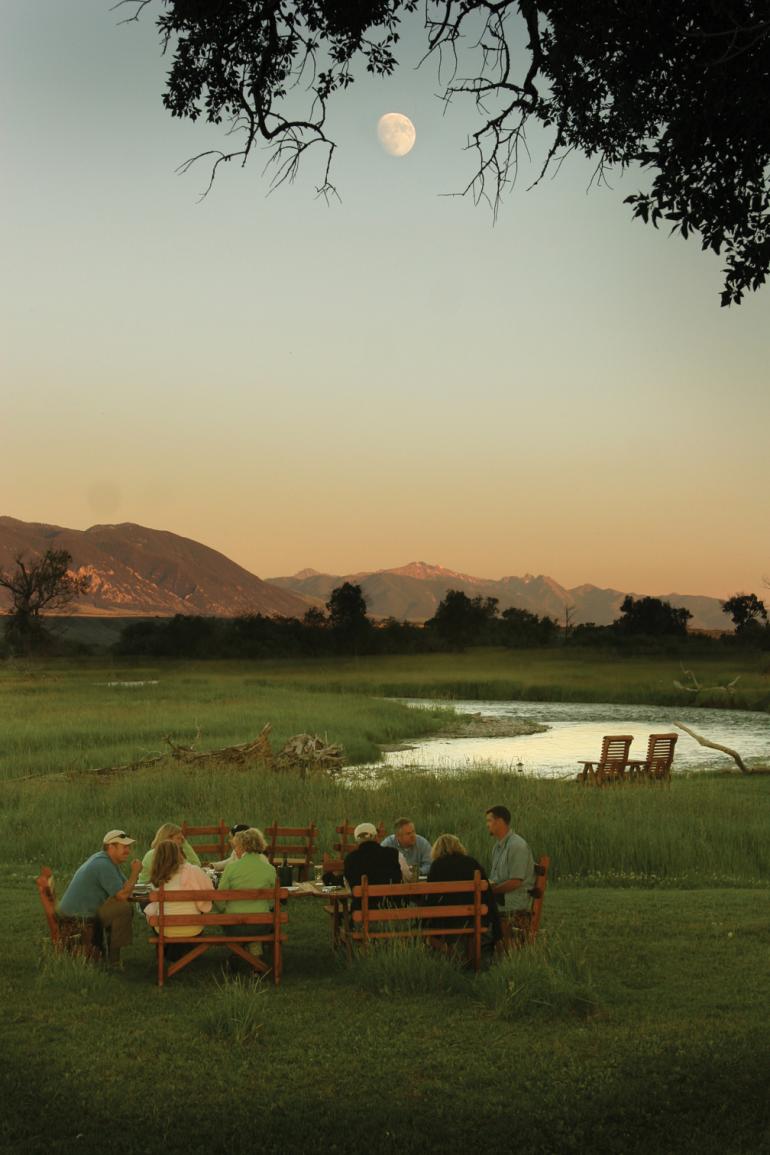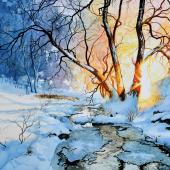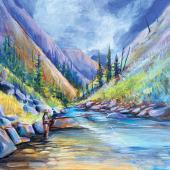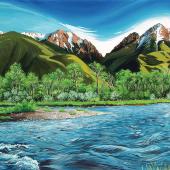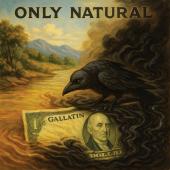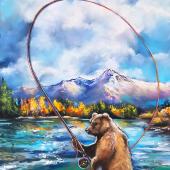Guest Season
A summer migration of visitors.
More guests, guests in summer pouring into the homes of all southwest Montanans like water through a breach in the earthen wall of the other nine months, friends and family compressing the long supple year to a single point, vacation, so that Montanans can only joke about it among ourselves, about the intensity and busyness of summer: entertaining those guests (beloved, it’s true), cooking, taking hikes, canoeing, fishing—doing everything at a recreational pace that we would probably never otherwise attain, left unchallenged by summer visitage…
Compared to the tales of some of our other neighbors, my wife and I seem to have it pretty easy. Most of our guests are low key and self-entertaining—a particularly useful trait when one batch is leaving on Sunday morning and another arrives that evening.
Ferocious games of badminton, out on the grass-clad rocky drainfield, like some crude stone-age parody of Victorian England. The shuttlecock (made of true grouse feathers and cardboard; we lost the plastic one) fluttering upward—while just beyond the stone wall in the dark forest, lions and bears wander, their footprints squishing in the mud along the little creek bank. A great gray owl, with its four-foot wingspan, cruises through the yard at dusk (made curious by the shuttlecock perhaps) and alights in a tree at the edge of the woods and watches for a while, its head seeming as large as a man’s.
The girls manage to capture a tiger swallowtail, one which has already been wounded in a previous engagement, and decide to keep it for a pet, for a few days. They bring it into the house and put her—they have named her Zoey, so we know she’s a female—on the cut flowers in a vase. For the rest of the evening and much of the next day, she flies around the house, looking so festive and exuberant that it makes some of the adults wonder, “why not have a butterfly for a pet, and let it have the run of the house? What’s a little occasional yellow dusting against the kitchen window?” The tiny sound of butterfly wings fluttering, at night, just before she goes to roost.
Soon, however, some accident befalls Zoey. Some excess of kindness or attention from the girls is my guess. Perhaps they tried to fashion a dress for her, or a leash, to take her out to their clubhouse. The next day, Zoey breathes her last, languishing and then expiring, with a sad and disturbing shudder reminiscent of a Hollywood heroine, teaching the girls the first and easiest lesson: wild things don’t belong in captivity.
With a garden hand-shovel, we dig a grave on a sunny patch of hill, amidst the blossoming yarrow upon which she liked to feed. There are a half a dozen of us standing around the graveside. I quote the epigraph from Jim Harrison’s novel Davla: “we loved the earth but could not stay,” and then we fill the hole back in with its three shovelfuls of loose sun-grayed dirt, and tamp in the headstone, a piece of broken clay tile, upon which the girls have scrawled in black Magic Marker, “here lies Zoey, a faithful pet, beloved by all.” We take turns speaking at the gravesite, and then we stand around a few moments longer, each of us thinking quiet thoughts, and then wander back up to the house, to begin preparing the evening’s feast for that week’s worth of guests.
The weeds get worse each year in Montana, and all throughout the West. They displace the native forbs and grasses upon which many of the intricate species of this forest depend. Some years, in July, we put our guests to work pulling the weeds by hand. Sometimes the fires come in August, and when that happens, summer is compressed even further, to a two-month spark of light, June and July—get your playtime in quick.
There is a part of me that wonders whether I should even worry about the weeds out in the field, and should instead abandon them to the relentless vigor with which they try to swarm the perfect green meadow out in front of the house.
Shouldn't we just be out playing? Sometimes I sense our guests, with their sore backs and blistered hands, sweaty and bug-bitten, wondering the same. But the days are long, and we try to make time for both, time for everything. After unrooting the thistles, grubbing the sprouts of hawkweed, and assailing the gentle dandelions, we’ll load up the canoe and go fishing, paddling back and forth on the heated, windy lake: paddling into the wind, drifting back; forward, then back. Fish flopping in the bottom of the canoe when we pull them in, green-and-yellow lily pads atop the lake, frogs, blue sky. Black-and-yellow butterflies. And our guests leave, I think, with the image that in Montana, in the summer, it is always this way, bliss and days of long light, as suspended in time as perhaps childhood itself.
More wind, rivers of wind further into July—brushing against the end of July—so that not only the tall marsh grass itself is bent flat, shuddering, but even the more slender of the lodgepoles are bent over like taut fishing poles that have hooked their tight lines to some invisible underground force, one they might or might not have been seeking in the first place.
The next morning, a goldfinch is perched on the alder branch closest to my window. Though it’s early, already the dry wind is blowing again. Out along the water’s edge, Bohemian waxwings chase moths, stalling and swooping, but that one bird—the greenish-yellow goldfinch—sits there next to my window with its head cocked, looking in. Its eye is dark and wet and fixed. As I stand motionless so as not to frighten it, looking back, it seems certain to me that across that short distance—three, four feet—I can feel deeply the first summonings, already, of migration. As if only this morning, for the first time all summer, has that biological imperative surfaced. As if today, only today, summer is already turning the corner and heading for fall, even after having only just arrived. As if it was never anything more than merely another guest.


